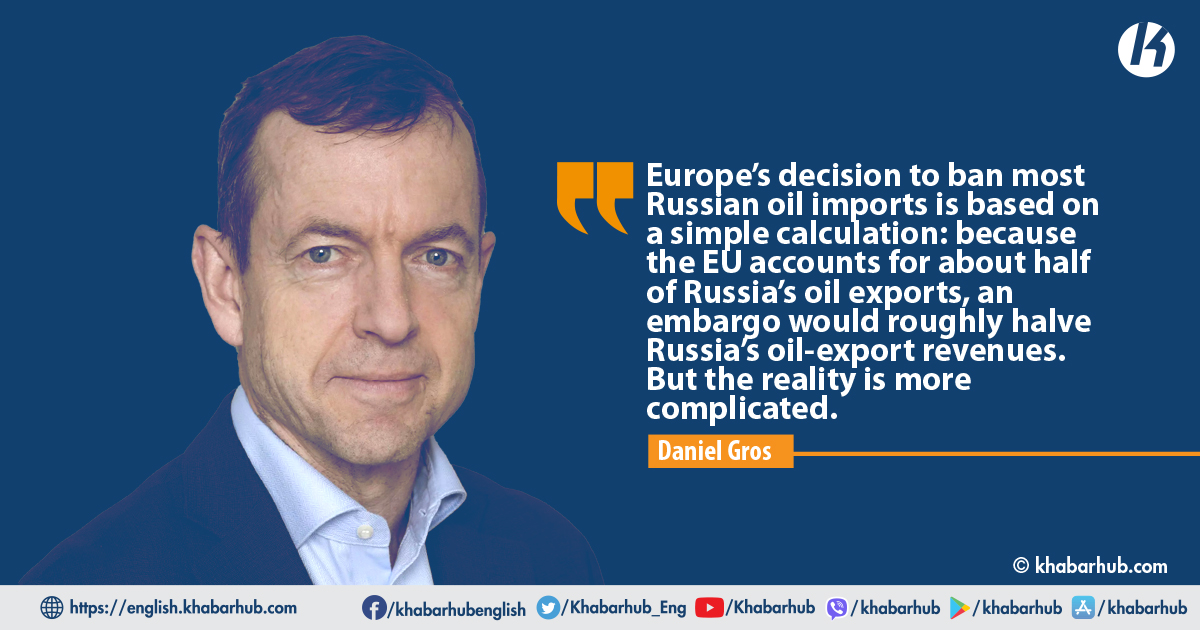As the war in Ukraine passes the 100-day mark, it is worth asking how much damage Western sanctions have done to Russia’s economy, and whether forthcoming measures – especially the European Union’s newly announced embargo on most Russian oil – can change Russian President Vladimir Putin’s strategic calculations.
Oil used to provide the bulk of Russia’s export earnings. In December 2021, exports stood at 7.8 million barrels per day – an annual rate exceeding 2.8 billion barrels.
While this is a pre-invasion figure, Russia is expected to maintain robust export capacity until lack of access to cutting-edge Western equipment limits production.
In the short run, Western sanctions will not affect Russia’s oil output. Moreover, domestic use is falling as the Russian economy contracts.
Russia can thus sustain its oil exports for the time being, and, at $110-120 per barrel, exports of crude alone could earn Russia over $300 billion per year – enough to finance its government and sustain its war.
The EU embargo is supposed to prevent this. The math making the rounds in diplomatic circles is simple: if the EU – which accounts for about half of Russia’s oil exports – stops importing Russian crude, Putin will lose $150 billion. But the reality is more complicated.
Because demand for oil is very inelastic in the short run, even a small reduction in the flow of oil reaching global markets can cause prices to rise significantly.
The importance of oil prices to Russia’s geopolitical calculations cannot be overstated. Toward the end of 2014, Russia had begun to participate more openly in the fighting in Ukraine’s eastern Donbas region.
Indeed, studies show that, in the short run, revenues from oil sales increase when less oil is available. In other words, skyrocketing prices will boost Russia’s export earnings, giving the impression that sanctions have failed.
To be sure, prices will gradually decline again, as other countries, eager to take advantage of high prices, step up their oil production.
Profit – not political pressure from the United States – was probably the primary motivation behind OPEC’s recent decision to increase production targets. Nonetheless, by the time prices fall, Russia will have reaped considerable revenues.
There is another key reason why the EU’s embargo on Russian oil will have only a limited impact: oil is a fungible commodity.
Countries like India and China – which together consume twice as much oil as the EU – can purchase the oil that Europe otherwise would have imported. It is thus not possible to stop Russia’s oil exports.
It is also worth noting that the EU embargo applies only to seaborne imports of Russian crude oil, not to imports via pipeline.
This partial ban – the result of a laborious compromise – is likely to be largely ineffective, because the seaborne oil, which has to be loaded onto tankers anyway, can easily be redirected to other destinations.
The success of sanctions should be measured not by the quantity of Russian oil Western countries import, but by how much revenue Russia collects from its exports. The key is lower prices, not lower volumes.
Any assessment of Russia’s potential export earnings should be based on the price at which the country can sell crude, rather than the world market price.
Here, the news is encouraging: a large gap has opened up between the European oil price and the price of Russian oil, which is now being sold at a steep discount of some $30 per barrel.
This divergence emerged right after Russia invaded Ukraine, indicating that it was a result not of official sanctions, but of self-sanctioning by traders, shippers, and importers who did not want to be associated with Russia.
High global prices mean that, even with this discount, Russia is earning around $80-90 per barrel. That is at least double the cost of production (around $40 per barrel), and far exceeds the price level a year ago.
But, even though Russia is profiting from its oil exports, it is making almost $100 billion less per year than it would if it was selling its oil at full price.
And these losses could grow larger, as a result of a less noticed – but potentially more important – decision taken at the same time as the EU embargo was announced.
A substantial increase in oil production by other countries would help achieve this; an embargo on Russian oil will not. Western political leaders should acknowledge this reality, and admit that crippling the Russian economy is not within their power.
The EU and the United Kingdom agreed to a coordinated ban on insuring tankers transporting Russian oil. This will significantly impede Russia’s ability to ship its oil to buyers around the world, and should compel it to sell its output at an even larger discount.
The importance of oil prices to Russia’s geopolitical calculations cannot be overstated. Toward the end of 2014, Russia had begun to participate more openly in the fighting in Ukraine’s eastern Donbas region.
If it continued to push further into Ukraine, the then-nascent Ukrainian military would not have been able to mount much resistance.
But oil prices plunged from more than $100 to less than $50 per barrel – and Putin agreed to the Minsk agreements, which stopped the Russian advance.
Although international prices are now far above this level, the good news is that, given the discounts Russia is being forced to offer, global prices must fall to only $80 per barrel to cause significant economic pain.
A substantial increase in oil production by other countries would help achieve this; an embargo on Russian oil will not. Western political leaders should acknowledge this reality, and admit that crippling the Russian economy is not within their power.
(Daniel Gros is a member of the board and a distinguished fellow at the Centre for European Policy Studies)
Copyright: Project Syndicate









Comment